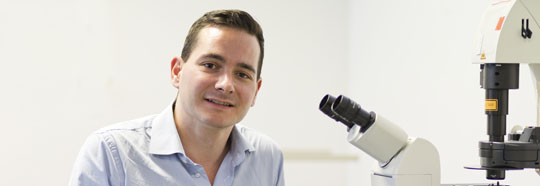Inspired by life
Freiburg, Sep 08, 2017
Andreas Walther has been the Professor of Functional Polymers at the Faculty of Chemistry and Pharmacy at the University of Freiburg since November 2016. His research is into bio-inspired materials systems which can be programmed to carry out certain functions. This has earned him a European Research Council (ERC) Starting Grant of 1.5 million euros over five years. The University of Freiburg is celebrating the 10th anniversary of the ERC Grants scheme and the University's 50 Grant winners with a look at some selected projects. A new series will portray ten of them.
 Designer of macromolecules - Andreas Walther develops materials systems which he programs to carry out certain functions.
Designer of macromolecules - Andreas Walther develops materials systems which he programs to carry out certain functions.
Photo: Jürgen Gocke
Andreas Walther's research gets right down to the basics. "I am interested in materials systems which can act autonomously at the molecular level and can self-regulate their functional characteristics macroscopically," he says. To that end, polymers and other large molecules are treated with fuels and feedback mechanisms are embedded into them in complex reaction networks. This means that the resulting materials systems undergo a controlled change of characteristics.
The Lego model
For instance, one goal is to program a material in interaction with a fuel so that when the latter is used up after a set time, the material will return to its original state. "A possible application would be to use this kind of material during operations," Walther explains. It could be injected into the bloodstream, where the fuel would cause it to gel locally, so that bloodflow would be stopped for a precisely defined time. After the fuel was spent, renewed bloodflow would be ensured. "These materials organize themselves on the basis of the smallest building blocks. You could imagine the materials systems like Lego blocks," Walther says. "The fuel causes knobs to form on some of the blocks, and these hold the blocks together. This requires energy. However the building blocks are set up so that they use up the energy and fuel. Then the knobs disappear and the material returns to its original state." Another possibility is a material which, when injected into the body, is attracted to cancer cells because they have large amounts of biological fuel. The cancer cells could then be shut away or even gelled from inside and blocked.
 Lego blocks help illustrate how materials systems work: A fuel causes a knobbly surface to form; that holds the building blocks together.
Lego blocks help illustrate how materials systems work: A fuel causes a knobbly surface to form; that holds the building blocks together.
Photo: Thomas Kunz
The color of used-by
Along with the focus on medical applications, Walther is also researching very different possibilities. "We are working on display technologies with photon systems," he says. Think of the shiny wings of beetles. The aim is to control the color and reflective qualities of a material using a chemical fuel. It could be used in the printing of use-by dates: The ink would be reflective until the use-by date passed. "Ink like this is very complex and therefore hard to counterfeit."
 Will this food still keep? The use-by date is printed in reflective ink - which may help to answer the question in the future.
Will this food still keep? The use-by date is printed in reflective ink - which may help to answer the question in the future.
Photo: Rido/Fotolia
Walther is conducting experiments to find the right macromolecules for his building-blocks. The molecules could be specially designed. Walther can precisely control the molecular order and investigates which surface structures form on the molecules. The solubility qualities of the large molecules also play an important role. In series of experiments he investigates how much fuel the building-blocks use and how long it remains active under varying conditions. Along with synthetic polymers, Walther also uses DNA. "With DNA you can determine the sequence very precisely. That means much more precise work is possible, such that the effects can be better understood." Because DNA is often only available in small amounts, it will be necessary to transfer aspects of the knowledge to synthetic polymers.
Long-term research
What is important to Andreas Walther is to gain a fundamental understanding of the processes he investigates and to identify initial applications. "We work on foundations of basics-oriented problems," he says. He thinks the sponsorship offered by the European Research Council is ideal for this. "The Starting Grant is a fantastic opportunity for long-term research projects which involve an element of risk" - he adds that there is hardly anything like it on offer in Germany.
Walther started his research in a junior research group at the DWI - Leibniz Institute for Interactive Materials in Aachen. He has big goals for his work. "Bio-inspired materials are also being researched in bionics," Walther says, where the structure is important. His aim is to develop materials which at the molecular level really are inspired by the dynamics of life itself. That's why the fuels Walther and his team use include adenosine triphosphate (ATP), the universal energy source material in cells.
Petra Völzing

